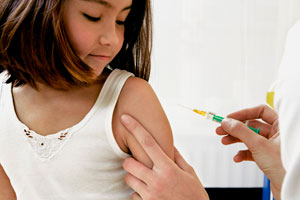Childhood Vaccines Condition Center
Childhood Vaccines
Vaccines or immunizations are the reason few people
have seen a child with polio, German measles, or whooping cough. At the
same time, concerns about vaccine side effects have led some parents to
avoid vaccinating their children, resulting in outbreaks of
vaccine-preventable diseases. There are currently 12 vaccines
recommended for children between birth and 18 years of age.
Childhood Vaccines News
-
In
the five years since launching a nationwide human papillomavirus (HPV)
vaccination program among girls between the ages of 12 and 26,
Australia has seen a huge drop in the number of cases of genital warts,
new research reveals. Among Australian girls in the targeted age range
for vaccination, the country saw genital wart cases plummet by 59
percent within just the first two years of the program’s launch in 2007.

-
Although
experts recommend girls and young women be vaccinated against the virus
that causes most cases of cervical cancer, parents seem to be
increasingly worried about the vaccine’s safety, a new U.S. study shows.
Experts say the findings are both worrying and puzzling, because the
vaccine — which guards against the human papillomavirus (HPV) — has not
been linked to any serious side effects.

-
A
British study finds that children and teens who were vaccinated during
the 2009 swine flu outbreak are at increased risk for narcolepsy, a
disorder that causes people to fall asleep during the day. The
particular flu vaccine involved has never been licensed for use in the
United States, according a statement on the U.S. Centers for Disease
Control and Prevention website.

-
By
Steven ReinbergHealthDay Reporter
TUESDAY, Feb. 7 (HealthDay News) — Despite earlier research that
suggested the rotavirus vaccine increased the risk of intussusception —
when a portion of the intestine slides forward into itself — a large new
study finds this is not the case.
“The findings of our study are reassuring and add to the evidence [...]

-
TUESDAY,
January 24, 2012 — Certain vaccines may not work as well in children
who have been exposed to high levels of perfluorinated compounds (PFCs),
a family of chemicals used to make everything from microwave popcorn
bags and pizza boxes to carpets and nonstick cookware, new research
suggests.
In a study published this week in the.
Sources: http://www.health.com/health/childhood-vaccines





No comments:
Post a Comment